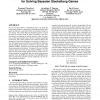112
Voted
CORR
2008
Springer
15 years 2 months ago
2008
Springer
Abstract--We consider multiaccess multiple-input multipleoutput (MIMO) systems with finite rate feedback with the aim of understanding how to efficiently employ the given feedback ...
111
click to vote
AAAI
1990
15 years 3 months ago
1990
We present a strategy for restricting the application of the inference rule paramodulation. The strategy applies to problems in first-order logic with equality and is designed to ...
130
click to vote
AAAI
1996
15 years 3 months ago
1996
This paper compares three commitment strategies for HTN planning: (1) a strategy that delays variable bindings as much as possible; (2) a strategy in which no non-primitive task i...
AAAI
1996
15 years 3 months ago
1996
Agents that operate in a multi-agent system need an efficient strategy to handle their encounters with other agents involved. Searching for an optimal interactive strategy is a ha...
102
Voted
IJCAI
2001
15 years 3 months ago
2001
The ability to handle exceptions, to perform iterated belief revision and to integrate information from multiple sources are essential skills for an intelligent agent. These impor...
111
Voted
ECIS
2001
15 years 3 months ago
2001
The progression of implementation of an information systems strategy in a UK acute hospital is described. The case study describes the IS strategy, the conditions that led to its ...
ECIS
2004
15 years 3 months ago
2004
Strategy planning processes often suffer from a lack of conceptual models that can be used to represent business strategies in a structured and standardized form. If natural langu...
102
click to vote
INTERACT
2007
15 years 3 months ago
2007
This paper presents the strategy of Mercedes Sanchez Usabilidade, a Brazilian consultancy firm, to spread the usability concept among consumers and companies in a way that no other...
159
click to vote
ATAL
2008
Springer
15 years 4 months ago
2008
Springer
In a class of games known as Stackelberg games, one agent (the leader) must commit to a strategy that can be observed by the other agent (the follower or adversary) before the adv...
125
click to vote
AAAI
2008
15 years 4 months ago
2008
In a class of games known as Stackelberg games, one agent (the leader) must commit to a strategy that can be observed by the other agent (the adversary/follower) before the advers...





